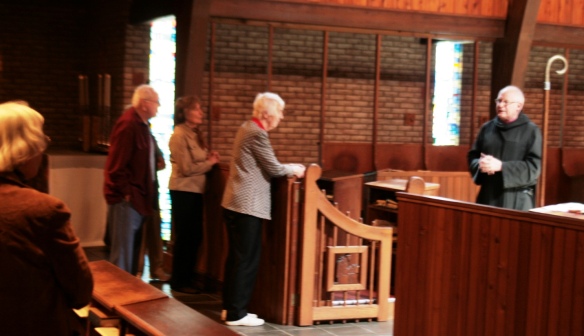 The last wishes of a dying person are traditionally considered sacred and binding on that person’s survivors. Although it is the seven recorded words on the cross that are considered the last words of Jesus, the prayer uttered by Jesus in John 17 constitute the last words of Jesus before he was handed over to be crucified. He prays that we disciples “may all be one. As you, Father, are in me and I am in you, may they also be in us, so that the world may believe that you have sent me.” (Jn. 17: 21) These words have been systematically disobeyed by those of us who are Jesus’ followers from that day until now.
The last wishes of a dying person are traditionally considered sacred and binding on that person’s survivors. Although it is the seven recorded words on the cross that are considered the last words of Jesus, the prayer uttered by Jesus in John 17 constitute the last words of Jesus before he was handed over to be crucified. He prays that we disciples “may all be one. As you, Father, are in me and I am in you, may they also be in us, so that the world may believe that you have sent me.” (Jn. 17: 21) These words have been systematically disobeyed by those of us who are Jesus’ followers from that day until now.
The trouble with complaining about our disobedience to Jesus’ last prayer is that our complaints fall into accusations of other people who are responsible for the disunity, even if we do include ourselves in the accusations. In accusing others of disunity, we tend to think other people have to come to their senses and make the adjustments to bring about unity. As long as that is the case, we will all be waiting until the end of time.
As if obeying Jesus’ final prayer was not hard enough, the Gospel of John undermines the vision of unity in the high priestly prayer in many ways. It is the most combative of the Gospels with its fierce debates between Jesus and “the Jews.” To take one painful example, Jesus says to “the Jews: “You are from your father the devil, and you choose to do your father’s desires.” (Jn. 8: 44) Even in the high priestly prayer, Jesus refers to “the one destined to be lost.” (Jn. 17: 12) If anyone at all is missing, what kind of unity do we have?
Discouraging as this reflection is, the most amazing thing about John’s Gospel is that it draws our attention to this tension, and refers to the one destined to be lost. Why spoil the party by mentioning anybody who is “lost?” When we go back through the scriptures with the “lost” Judas in mind, we find many other “lost” people such as Achan who was stoned for taking some of the booty after a battle (Josh. 7) or Tamar, Absalom’s sister, who was raped, not to speak of the multiple victims in the book of Judges. We find that scripture constantly reminds us of people who are otherwise “lost” or forgotten. The same thing happens in the last chapter of Revelation where all who are thirsty are invited to come. Yet outside are the “dogs and sorcerers” and all other wicked people. One can say that murderers deserve to be outside the gates and we should be glad they are. But is Jesus’ final prayer fulfilled as long as these bad people are outside? We are quick to celebrate case closed and mission accomplished, but scripture leaves these loose ends that unravel such premature celebrating.
Unity, then, seems to be beyond us, although it exists in God’s mysterious triune unity where Jesus and his heavenly Abba and the Paraclete dwell within each other and in each of us. In the midst of the hope of this unity from before the world began, we feel the pain of those who are missing, regardless of whose fault it is. The story of Paul and Silas in jail (Acts 16: 16–34) offers us a sense of direction of what we can do. That Paul and Silas should be thrown in jail for preaching the Gospel points to a lack of unity among people. When they are miraculously freed from their chains, they could have run off and left the jailor to his fate. But they did not. First, they reached out to the jailer and not only saved his life, but they won him and his household to Christ. Bringing about unity for all people is not something we can accomplish on a dime, but we can each reach out to other people and seek to create and strengthen unity through the opportunities that come our way.

Pingback: Prayer of a man of flesh and blood who is authorized and glorified by God – Belgian Ecclesia Brussel – Leuven